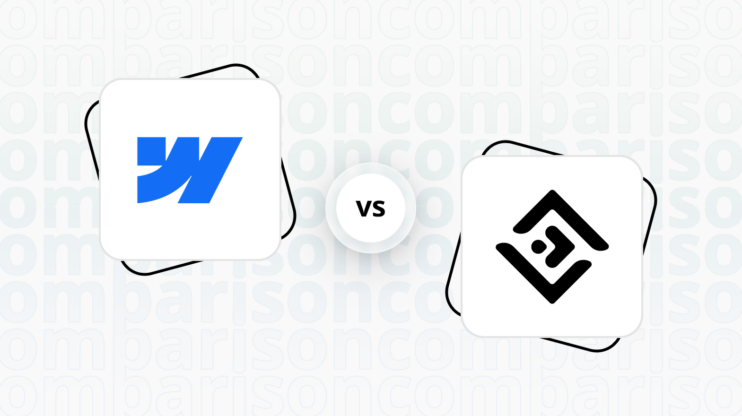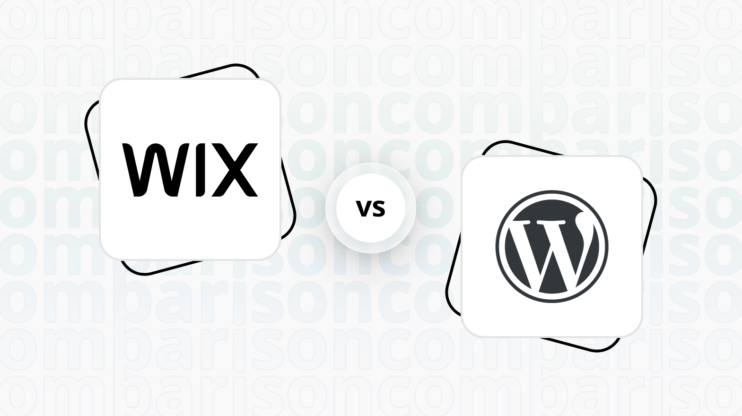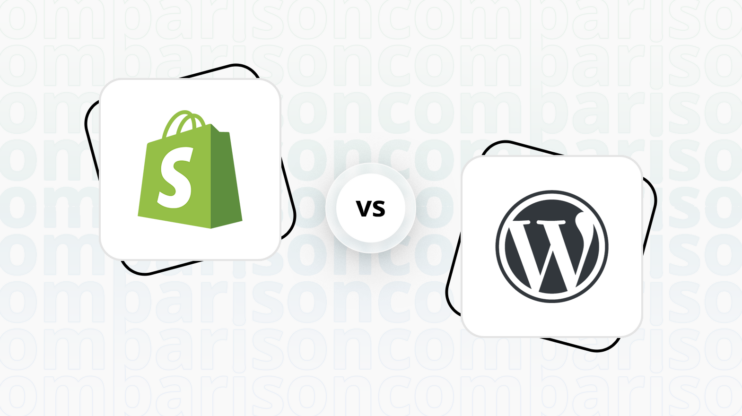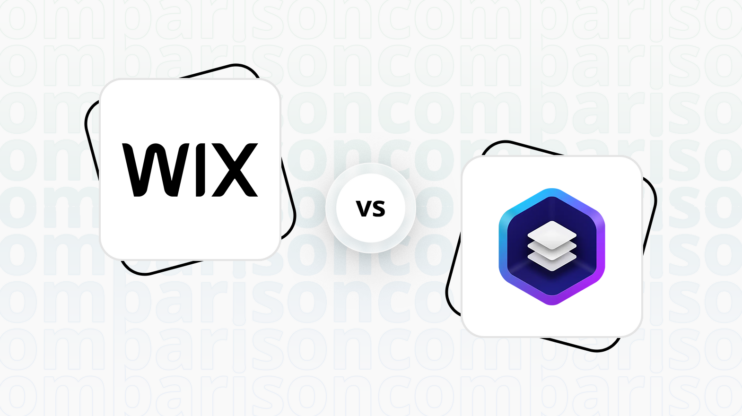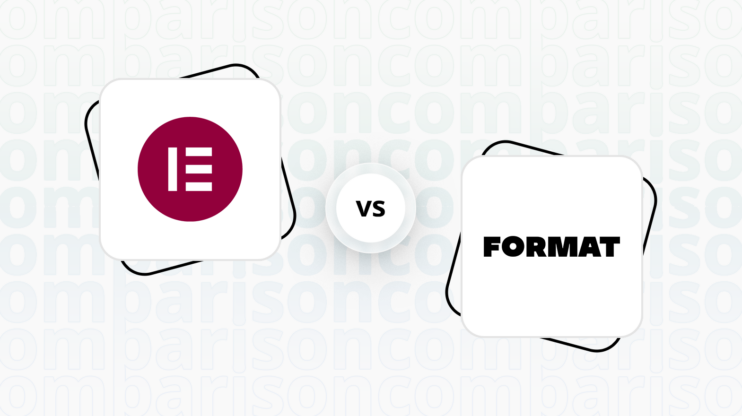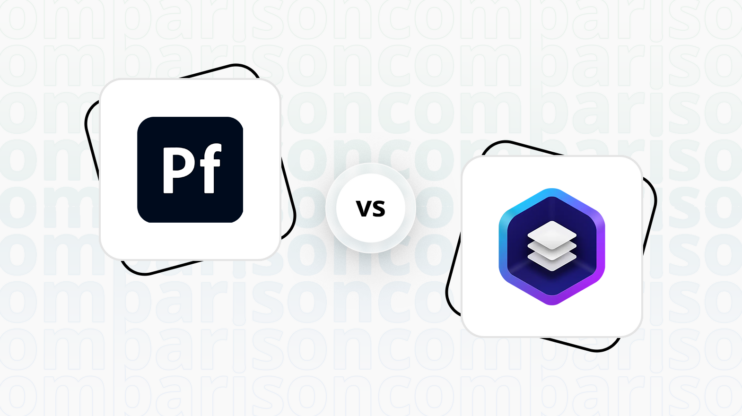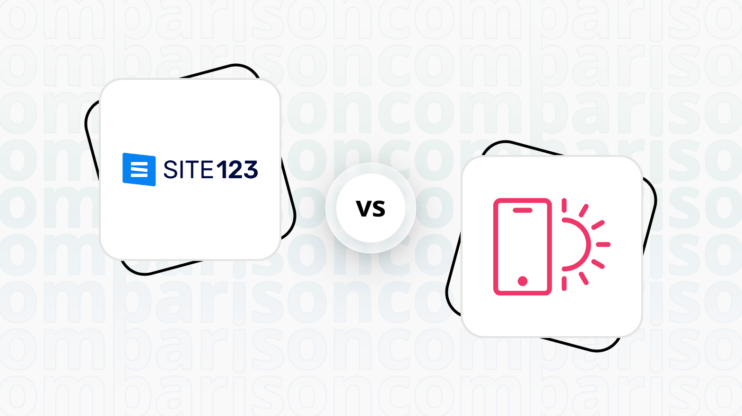Final verdict
Webflow and Duda present compelling options for different user needs, with both platforms showcasing unique strengths.
-
Webflow (Overall Grade: 7.9/10)
excels in offering a powerful platform for users who prioritize design flexibility and customization. It stands out for its robust design tools, comprehensive marketing features, and superior website speed optimization. Webflow is particularly suited for professional designers and users who require detailed control over their website’s design and functionality, despite its steeper learning curve. -
Duda (Overall Grade: 7.8/10)
shines with its user-friendly interface, making it an excellent choice for users seeking ease of use without sacrificing professional design. Duda scores higher in customer support, security, and AI capabilities, offering a more streamlined experience for creating and managing websites efficiently. It’s particularly well-suited for agencies and designers managing multiple client websites, thanks to its white label options and extensive template library.

|

|
|
|---|---|---|
|
Design functionalities & templates |
8.6 |
8.3 |
|
Ease of use |
7.5 |
8.4 |
|
Ecommerce |
8.5 |
7.4 |
|
Website Editors |
9.0 |
8.3 |
|
Product testing options |
6.3 |
8.4 |
|
Price |
8.0 |
7.9 |
|
Hosting quality |
8.9 |
8.8 |
|
Website speed optimization |
8.1 |
7.6 |
|
Plugins and integrations |
5.5 |
7.7 |
|
Marketing features |
7.8 |
7.1 |
|
Customer support |
8.3 |
7.5 |
|
Security |
7.8 |
8.6 |
|
AI capabilities |
8.3 |
7.3 |
|
User Management |
8.3 |
8.0 |
| Overall |
7.9 |
7.8 |
Best for ecommerce
 8.5
8.5
 7.4
7.4
Verdict
: Webflow edges out Duda with its more comprehensive ecommerce features and customization options, making it the better choice for businesses looking for a robust online store solution.
-
Webflow
: Offers a powerful suite of ecommerce tools designed for professionals, including extensive customization without the need for coding, advanced product management, and seamless integration with major payment gateways. Its higher ecommerce score reflects its capability to cater to a wide range of ecommerce needs. -
Duda
: Provides a user-friendly approach to ecommerce with essential features like product and inventory management, and payment processing. It’s a solid option for those who prioritize ease of use over extensive customization. However, its lower ecommerce score indicates it may not be as versatile as Webflow for more demanding ecommerce projects.
Best for informational & business websites
 8.6
8.6
 8.4
8.4
Verdict
: Webflow slightly outperforms Duda for informational and business websites, thanks to its superior design capabilities and flexibility, despite Duda’s strong showing in ease of use and template variety.
-
Webflow
: Webflow shines for those seeking to create custom, responsive websites with a focus on design and functionality. Its powerful design tools and flexible CMS cater to professional designers and businesses wanting a unique online presence. -
Duda
: Duda is a strong contender, especially for users prioritizing ease of use and quick deployment. With a wide range of customizable templates and features, it’s well-suited for creating professional-looking websites without extensive coding knowledge.
Detailed comparison
Design functionalities & templates
Design FunctionalitiesRepresents how well each platform allows for creative design and customization of websites.Score Components:
- Template Variety (30%): Range and quality of design templates.
- Customization (30%): Flexibility and options for design alterations.
- User Interface (20%): Ease and intuitiveness of the design process.
- Responsiveness (10%): Adaptability to different devices and screen sizes.
- Innovation (10%): Unique design features and tools.
 8.6
8.6
 8.3
8.3
🏆
Winner: Webflow.
If you’re looking for a platform that offers more creative control and a wide array of design features, Webflow is the preferred choice.
Webflow delivers a robust design experience with a diverse range of template and customization options. Boasting over 1000 pre-built templates covering various industries and website types, including free and premium options, Webflow ensures a constantly evolving library for users. Templates are categorized for easy browsing, considering industry, website type, style, and features. The design customization features include a visual drag-and-drop editor for real-time adjustments, fine-grained control over every aspect of the design, and the ability to inject custom code for advanced users seeking additional personalization and unique functionalities.
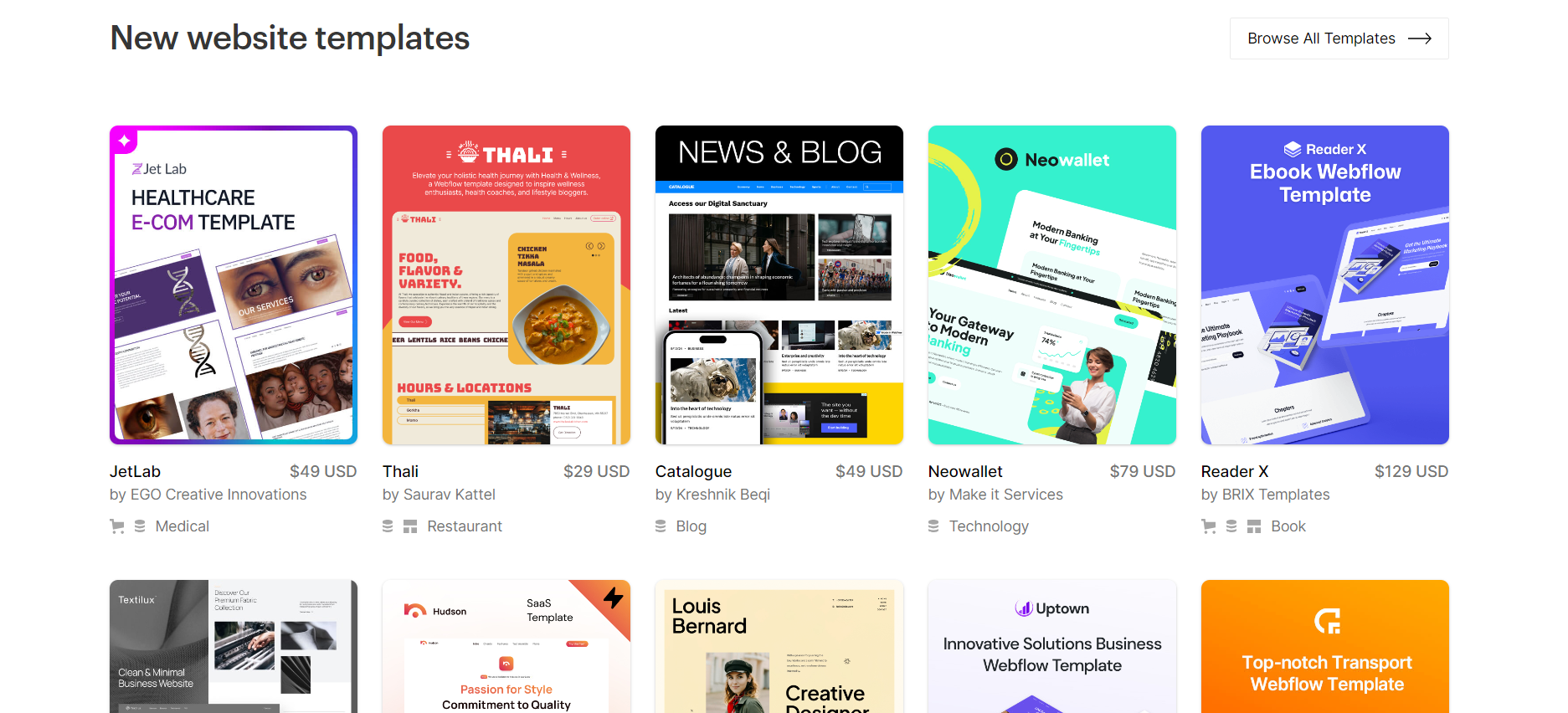
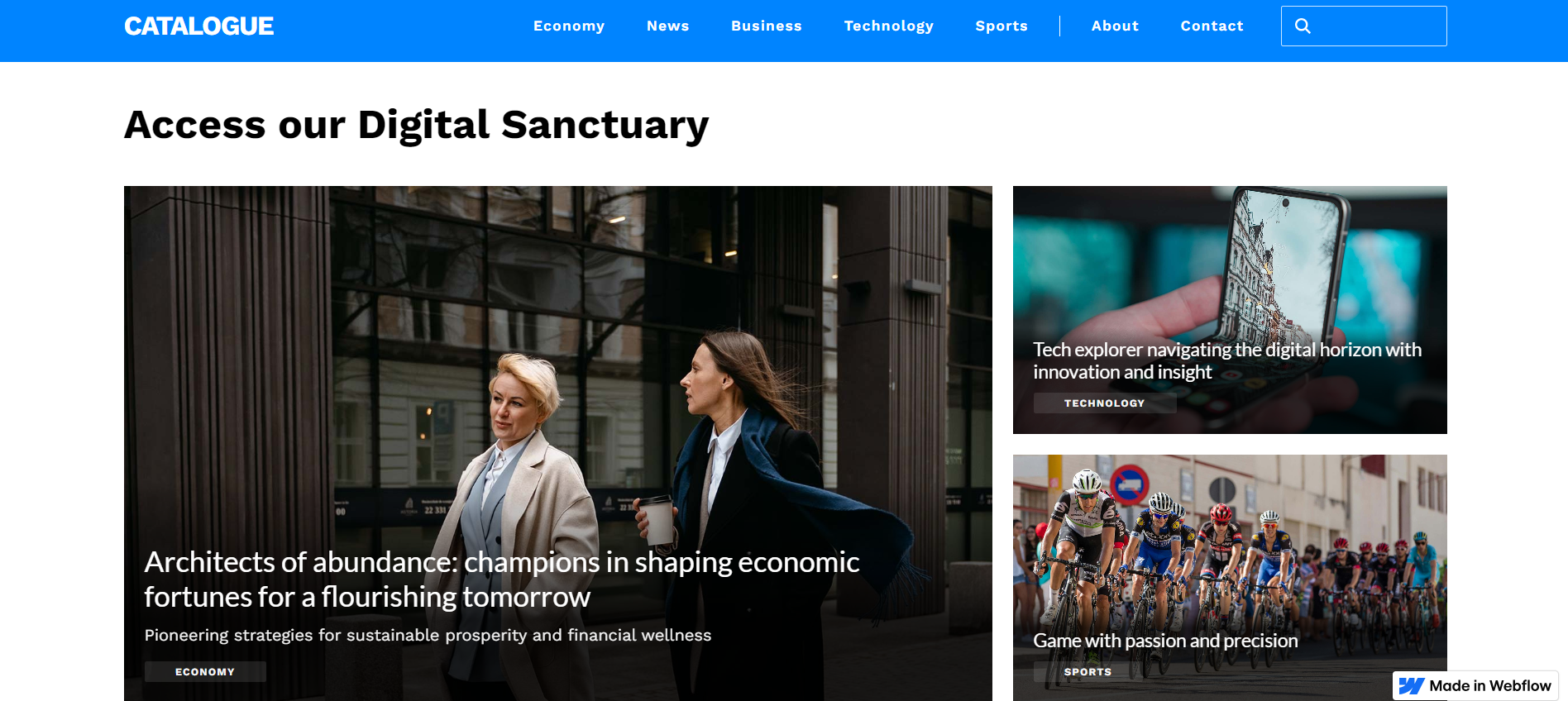
Compared to Webflow, Duda offers a wide variety of templates and designs for its website builder. With over 180 templates to choose from, users have the flexibility to create a website that suits their unique needs and style. The templates are professionally designed and cover various industries, ensuring that businesses of all types can find a suitable option. Additionally, Duda allows users to customize the templates further, giving them the freedom to personalize their website’s design and layout. Overall, Duda provides a diverse range of templates and design options to help users create visually appealing and functional websites.
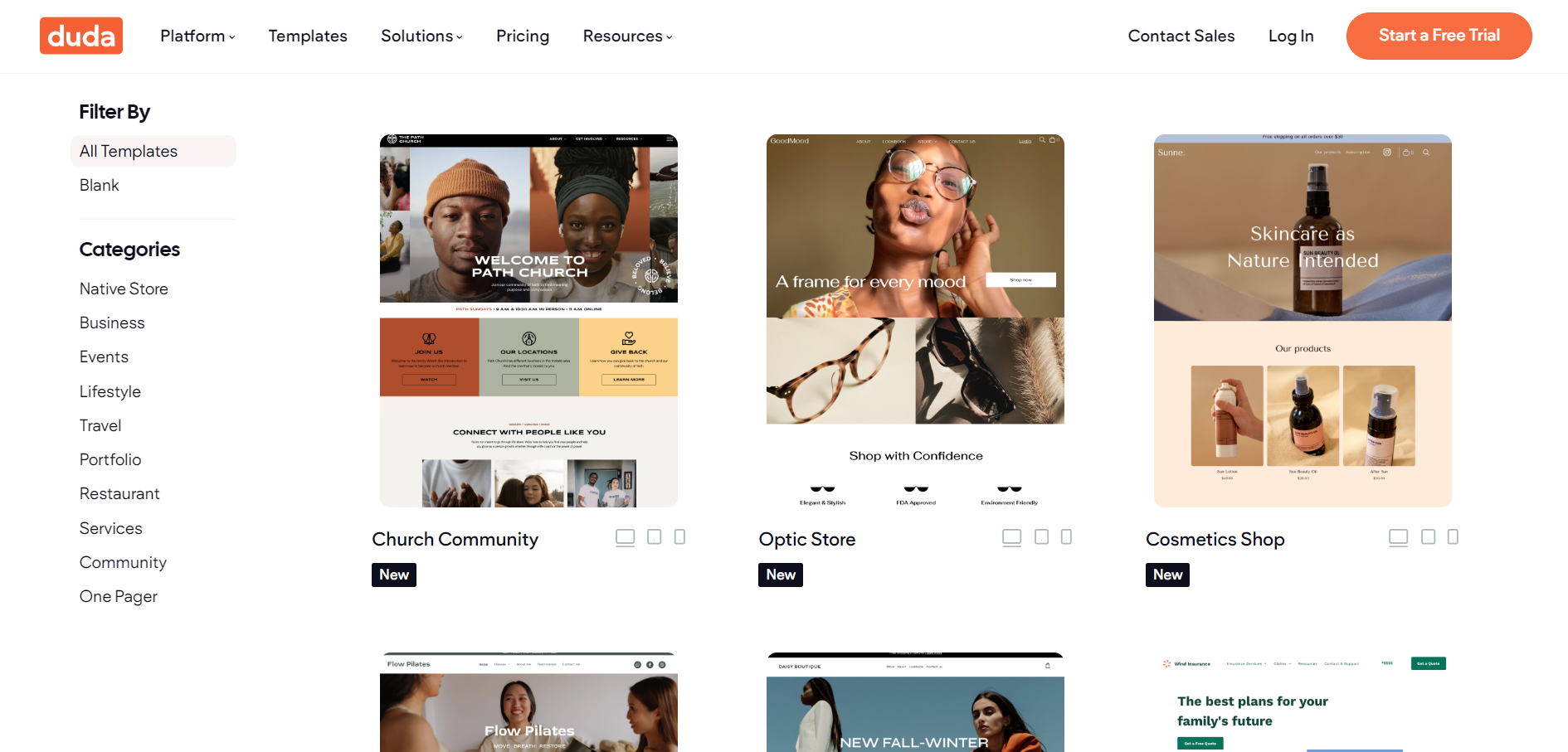

Get a head start on website creation with AI
Create a custom website tailored to your business needs 10X faster with 10Web AI Website Builder!
Ease of use
Ease of useReflects the platform’s overall user-friendliness.Score
Components:
- Learning curve (40%): Quickness and ease of getting started.
- Interface design (30%): Simplicity and intuitiveness of layout.
- User guidance (20%): Quality of tutorials and support.
- Flexibility (10%): Adaptability to various user skills.
 7.5
7.5
 8.4
8.4
🏆 Winner: Duda
. With a score of 8.4, Duda is praised for its intuitive user interface and a wide range of customizable templates, making it accessible for users of varying technical skill levels. Webflow, scoring 7.5, offers a visually intuitive interface with drag-and-drop features but has a steeper learning curve, especially for beginners.
Learning Resources
🏆 Winner: Tie
. Both Webflow and Duda offer comprehensive and high-quality learning resources. Webflow University and Duda University serve as excellent starting points, delivering diverse courses and tutorials covering fundamental to advanced aspects of their respective platforms.
For ecommerce
EcommerceMeasures the platform’s effectiveness in supporting online business activities.Score Components:
- Ecommerce themes and templates (20%): Variety and design of templates.
- Product management (25%): Ease of managing and organizing products.
- Payment options (25%): Variety and convenience of payment methods.
- Ecommerce features (20%): Features for managing an ecommerce store.
- Integration (10%): Compatibility with external e-commerce tools and services.
 8.5
8.5
 7.4
7.4
Webflow and Duda both offer robust ecommerce capabilities, but Webflow scores higher in this category. Webflow’s ecommerce features are comprehensive, including easy store creation without coding, extensive customization options, product management with variations, inventory tracking, integration with major payment gateways, automated shipping calculations, tax configuration, and marketing tools like abandoned cart recovery and email marketing. Duda, on the other hand, offers a user-friendly ecommerce solution with features like product and inventory management, payment processing, shopping and tax settings, coupons and discounts, SEO and marketing tools, and analytics and reporting.

|

|
|
|---|---|---|
|
Ecommerce themes and templates |
7.5 |
6.5 |
|
Product page customization |
8.3 |
7.5 |
|
Payment processing and commissions |
7.8 |
7.0 |
|
POS capabilities |
6.5 |
5.5 |
|
Payment gateways |
8.0 |
7.5 |
|
Product numbers |
7.0 |
7.0 |
|
Additional ecommerce features |
7.9 |
7.0 |
Webflow ecommerce features:
- Checkout and Payment Processing with Stripe, PayPal, etc.
- Marketing and Promotions
- Tax and Shipping calculations
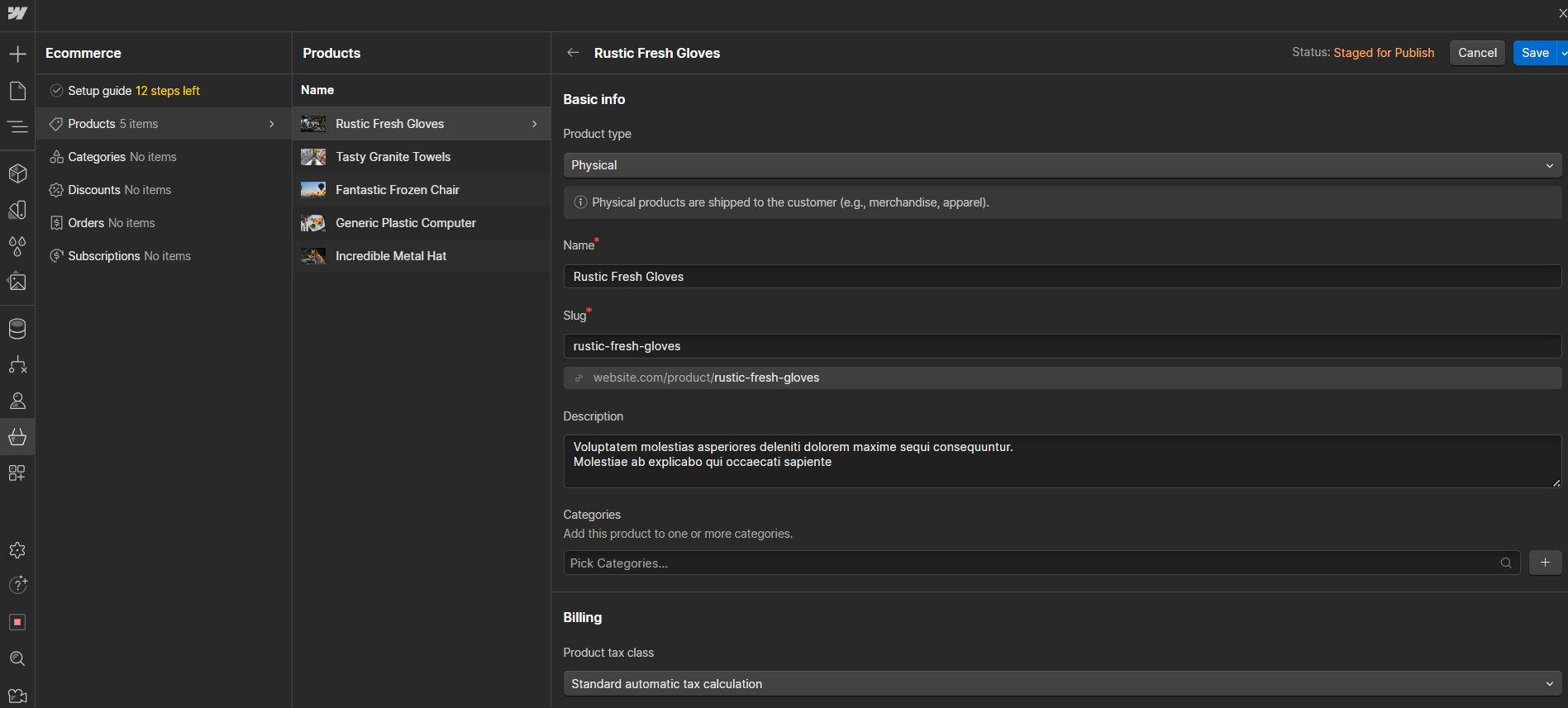
Duda ecommerce features:
- Product and Inventory management
- Payment processing
- Shopping and Tax settings
- Coupons and discounts
- SEO and Marketing tools
- Analytics and reporting
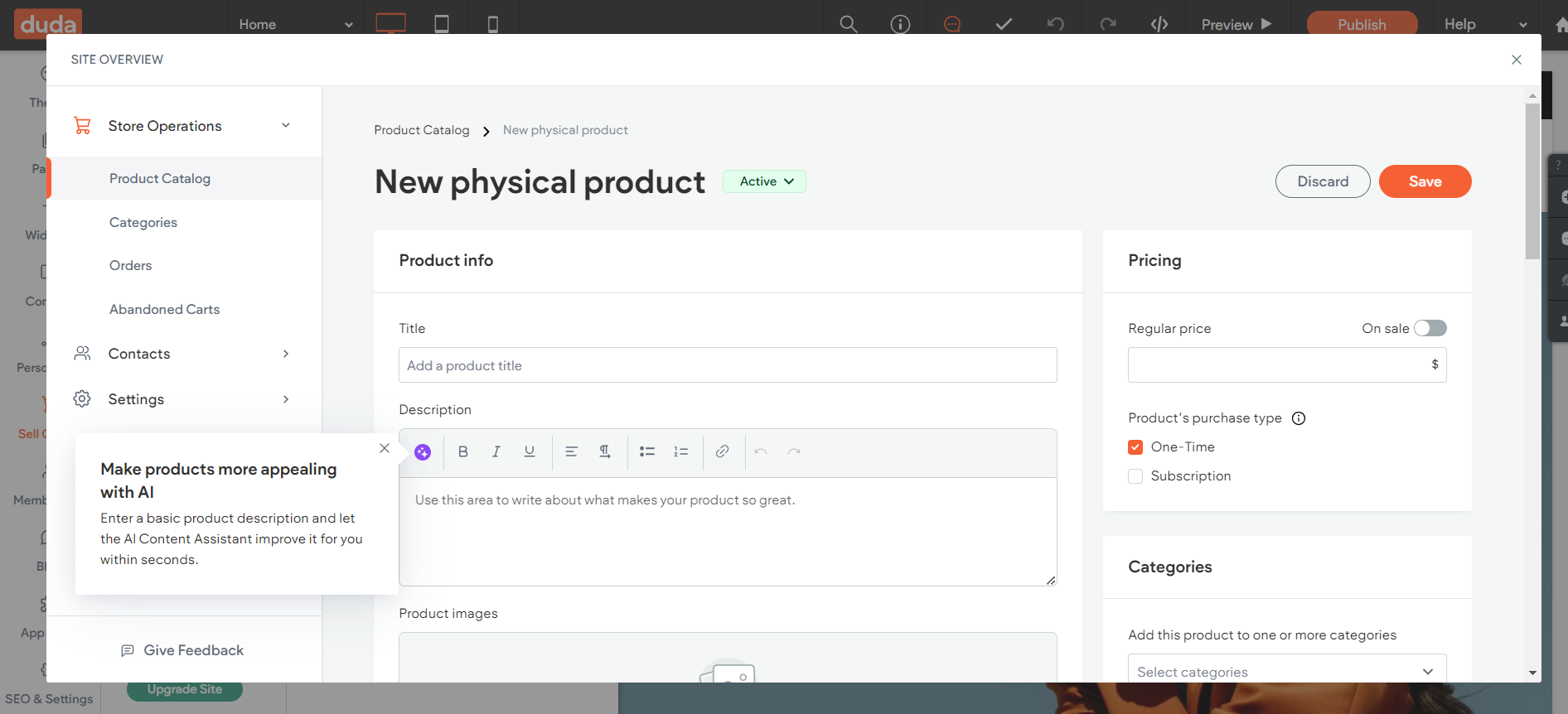
Ecommerce themes & templates
Webflow offers a diverse range of ecommerce themes and templates designed to cater to various types of online stores, from fashion and technology to artisan crafts and children’s products. Each template comes equipped with built-in ecommerce functionality, allowing you to easily add products and manage your store without the need for coding. Duda offers a small variety of ecommerce templates designed to help businesses create professional, responsive online stores. These templates are specifically tailored to support a wide range of ecommerce functionalities such as product catalogs, shopping carts, checkout processes, and payment gateways integration.
Product page customization
Webflow offers extensive customization options for eCommerce product pages, allowing users to design and personalize their pages without coding. It provides tutorials for creating product pages from scratch, offers responsive templates for various devices, and allows users to add custom code and dynamic content using Webflow’s CMS for maximum customization flexibility. Duda, on the other hand, allows users to easily add variations such as size and color directly from the product management section, defining attributes like small, medium, and large or red, blue, and green. Custom pricing and inventory management for each variation enable setting specific prices, promotional offers, SKU numbers, and inventory levels, facilitating detailed product version management. With the ability to assign unique images and descriptions to each variation, customers receive clear and specific information, enhancing their shopping experience. Additionally, Duda offers bulk import/export functionality through CSV files, streamlining the process for managing large inventories and reducing the risk of manual entry errors.
Payment processing
Webflow provides a flexible and secure platform for payment processing and ecommerce through integrations with leading payment gateways like Stripe and PayPal. This allows users to accept a wide range of payments, including credit card transactions directly from their websites. Given the versatility of Stripe and PayPal, businesses can manage online sales efficiently, and these integrations likely support various transaction types, potentially including POS transactions for physical sales environments. Duda’s website builder integrates with Stripe and PayPal for payment processing, offering various methods like credit cards and AliPay. While primarily an online store builder, it indirectly supports POS capabilities through these gateways. Duda also allows integration with third-party payment providers for flexibility and supports client billing using Stripe. Overall, it offers comprehensive ecommerce features, including over 30 payment provider integrations.
Website Editors
Website EditorsEvaluates the platforms’ website building and editing capabilities.Score Components:
- Customization tools (40%): Range and power of editing features.
- Editor usability (30%): User experience within the editor.
- Design flexibility (20%): Freedom in layout and design changes.
- Update and maintenance ease (10%): Simplicity of updating and maintaining the site.
 9.0
9.0
 8.3
8.3
🏆
Winner: Webflow
. With a score of 9.0, Webflow’s editor is praised for its intuitive visual interface that simplifies the process of designing and editing responsive websites without requiring deep technical knowledge. It offers a perfect blend of ease of use for beginners and the flexibility for more advanced users, enabling significant cost savings by allowing users to customize and manage their sites without hiring professionals.
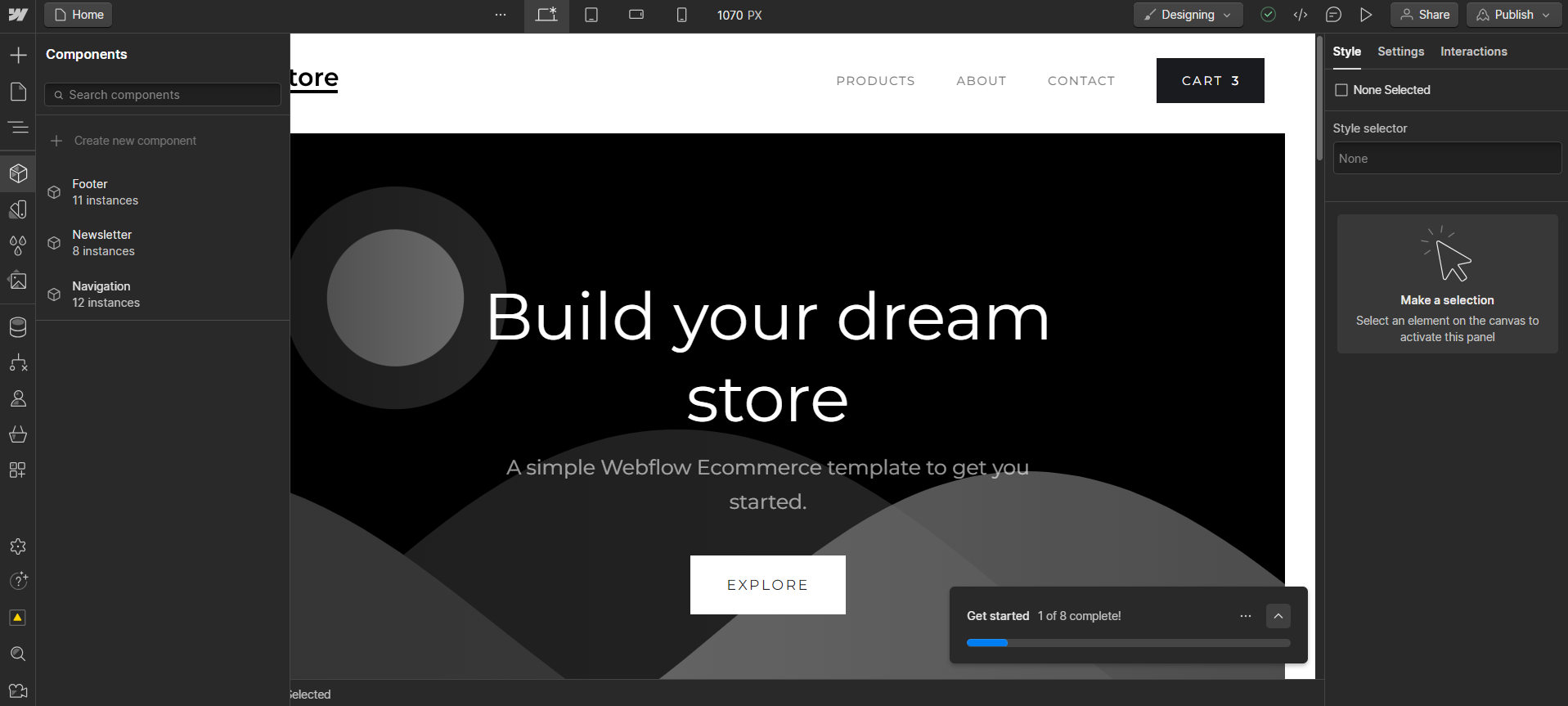
Duda’s editor, scoring 8.3, is renowned for its simplicity and user-friendly interface, making it an excellent choice for both beginners and professionals looking to design and launch websites efficiently. With its drag-and-drop functionality, users can easily add, remove, and customize elements on their pages without needing any coding knowledge.
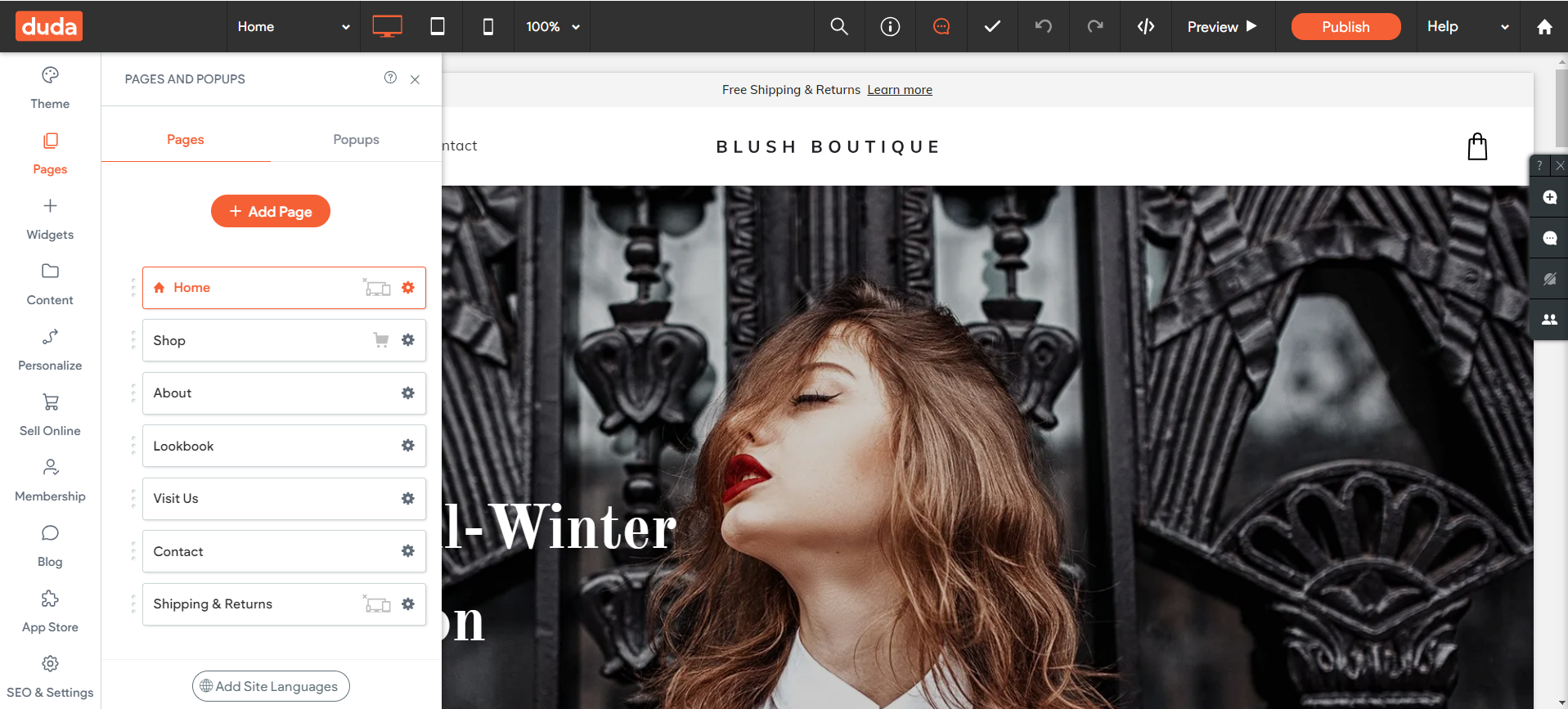
Mobile editor/app
 7.0
7.0
 5.5
5.5

🏆
Winner: Webflow
. Both Webflow and Duda do not have official mobile editor apps. However, Webflow has a third-party app called EditFlow, created by a community member for Webflow users, which is currently only available for iOS. This app allows users to make edits to their websites on the go.
Duda, on the other hand, supports mobile editing through its platform, allowing users to make limited edits and republish sites directly from mobile devices. However, the absence of a dedicated mobile app might limit the convenience and flexibility of editing on the go.
In summary, while both platforms lack official mobile apps, Webflow’s third-party app EditFlow provides a slight edge over Duda in terms of mobile editing capabilities.
Product testing options
Product Testing OptionsAssesses the options for trying out platform features before commitment.Score Components:
- Trial quality (40%): Extent and usefulness of the trial or free version.
- Feature accessibility (30%): How many features are available to test.
- Trial duration (20%): Length of the trial period.
- Ease of transition (10%): Smoothness of moving from trial to paid plans.
 6.3
6.3
 8.4
8.4
Overall Result
:
Duda Wins
. Duda scores 8.4 in product testing options, outperforming Webflow which scores 6.3. Duda offers a 14-day free trial with access to all features of each plan, providing a comprehensive testing experience. In contrast, Webflow offers a free plan with limited features and no trial version. Duda also provides a 30-day money-back guarantee, adding an extra layer of assurance for users.

|

|
|
|---|---|---|
|
Free Plan |
Yes |
No |
|
Trial Duration |
No |
14 days |
|
Testing Premium Features |
Basic features with free plan |
All features of each plan during trial |
|
Money Back Guarantee |
No |
30 days |
Price
PriceLooks at the cost-effectiveness and value for money of each platform.Score Components:
- Plan value (40%): What each pricing tier offers.
- Transparency and clarity (30%): Clearness of pricing structures.
- Flexibility of plans (20%): Range of options to suit different budgets.
- Hidden costs (10%): Additional expenses not included in the plan.
 8.0
8.0
 7.9
7.9
Webflow and Duda have similar pricing scores, with Webflow slightly ahead.
Both platforms offer a range of plans to cater to different needs, from basic websites to large-scale ecommerce operations.

|

|
|
|---|---|---|
|
Free |
Starter (Free): Limited features for new sites, including 2 static pages and 50 form submissions lifetime. |
No offering at this amount. |
|
$10-$20 |
Basic ($18/month): Suitable for simple sites with a custom domain, including basic SEO controls and 500 monthly form submissions. And 100 pages. Value for price: 6.5 |
No offering at this amount. |
|
$20-$30 |
CMS ($29/month): For content-driven sites with 2,000 CMS items, 1,000 monthly form submissions, and full API access. And 150 website pages. Value for price: 7.5 |
Basic ($25/month): Includes hosting for one website with email support, 99.99% uptime, and access to Duda’s AI Content Assistant. Value for price: 6.0 |
|
$30-$45 |
Standard ($42/month): For new businesses with up to 500 ecommerce items, includes basic ecommerce features, and 2% transaction fee Value for price: 8.5 |
Team ($39/month): Adds up to three team members, priority email, chat, and phone support, with team and client management features. Value for price: 7.0 |
|
$45-$50 |
Business ($49/month): High traffic capacity, advanced features like site search, and up to 10 content editors. Value for price: 8.0 |
No offering at this amount. |
|
$60-$90 |
Plus ($84/month): Higher volume businesses with 0% transaction fees, up to 5,000 ecommerce items, and advanced features. Value for price: 9.0 |
Agency ($69/month): Offers hosting for up to four websites with priority support, account management, and access to advanced features. Value for price: 8.0 |
|
$100+ |
Advanced ($235/month): Scalable solution for large online stores with up to 15,000 ecommerce items and the highest caps and 0% transaction fees. Value for price: 9.5 |
White Label ($199/month): For those needing to offer Duda under their own branding, including all Agency features plus white-label client access. Value for Price: 9.0 |
location. As a result in rare cases the prices displayed here can differ from the ones you see on their
websites.
Hosting quality
Hosting
qualityExamines the reliability and performance of the hosting solutions.Score Components:
- Uptime (40%): Consistency and reliability of website availability.
- Speed (30%): Loading times and performance.
- Bandwidth and storage (20%): Sufficiency of resources provided.
- Data centers (10%): Quality and distribution of hosting infrastructure.
 8.9
8.9
 8.8
8.8
Winner: Duda
. Both Webflow and Duda offer robust hosting solutions with 99.99% uptime. However, Duda edges out with its uptime guarantee across all plans and unlimited storage and bandwidth on AWS. Webflow, while offering managed hosting with scalable resources, only provides an uptime guarantee on its Enterprise plan.

|

|
|
|---|---|---|
|
Do they offer hosting? |
Yes, included in all paid plans |
Yes, included in all paid plans |
|
Data Centers: |
Webflow doesn’t actually have its own data centers. Instead, it relies on a globally distributed network of data centers from Amazon Web Services (AWS) and Fastly. |
Duda relies on Amazon Web Services (AWS) |
|
Type of hosting: |
Managed Hosting |
AWS Cloud Hosting |
|
Uptime: |
99.99% |
99.99% |
|
Uptime Guarantee: |
Only Enterprise plan, 99.99% |
Yes, 99.99% |
Website Speed Optimization
Website Speed OptimizationEvaluates optimization of website loading timesScore Components:
- PageSpeed Score (30%): Google’s score indicating performance optimization.
- Loading Time (30%): The average time until a website is fully interactive.
- Mobile Optimization (15%): Optimization effectiveness for mobile devices.
- Resource Optimization (15%): Optimizing images, scripts, and other heavy resources.
- CDN Usage (10%): Use of CDN to enhance speed across geolocations.
 8.1
8.1
 7.6
7.6
🏆 Winner: Webflow
Both Webflow and Duda prioritize website performance and page speed, with Webflow focusing on custom cache settings, custom element lazy loading, automatic minification, responsive templates, and CDN, and Duda emphasizing efficient code and file minification, CDN, image optimization, mobile-responsive designs, and AMP support. However, Webflow has a slight edge when it comes to website speed optimization.

|

|
|
|---|---|---|
|
Focus |
Custom Cache Settings, Custom Element Lazy Loading, Automatic Minification, Responsive templates, CDN |
Efficient Code and File Minification, CDN, Image Optimization, Mobile-Responsive Designs and AMP Support |
|
Performance Tools |
Google Lighthouse, PageSpeed Insights |
Google PageSpeed Insights Integration |
|
Key Strategies |
Custom Cache Settings, Custom Element Lazy Loading, Automatic Minification, Responsive templates, CDN |
Efficient Code and File Minification, CDN, Image Optimization, Mobile-Responsive Designs and AMP Support |
|
Load Times |
Below 2 seconds average |
Varies widely, depending on the optimization and user’s location |
|
Page Speed Scores Range |
77.2/100 |
Varies widely, depending on the optimization and user’s location |
|
Core Web Vitals Improvement |
Improving components’ usability, and emphasis on LCP, FID and CLS |
Emphasis on LCP, FID, CLS improvements |
Webflow has significantly focused on enhancing website performance and page speed, integrating tools like custom cache settings, custom element lazy loading, automatic minification, responsive templates, and CDN. It has an average load time of below 2 seconds and a PageSpeed score of 77.2/100. Webflow also emphasizes improving components’ usability and Core Web Vitals (LCP, FID, and CLS).
On the other hand, Duda also places a strong emphasis on website performance and page speed. Its approach includes efficient code and file minification, CDN, image optimization, mobile-responsive designs, and AMP support. However, both its load times and PageSpeed scores vary widely, depending on the optimization and user’s location. Duda also focuses on improving Core Web Vitals (LCP, FID, and CLS).
Get a head start on website creation with AI
Create a custom website tailored to your business needs 10X faster with 10Web AI Website Builder!
Plugins and integrations
Plugins and integrationsMeasures the range and effectiveness of additional plugins and integrations.Score Components:
- Variety of options (40%): Range of available add-ons.
- Integration smoothness (30%): Ease of integrating plugins into the site.
- Quality of plugins (20%): Functionality and reliability of the options.
- Custom integration capabilities (10%): Support for custom or third-party integrations.
 5.5
5.5
 7.7
7.7
🏆 Winner: Duda.
Duda scores 7.7, outperforming Webflow’s 5.5. Duda offers built-in widgets, app integrations, and the ability to create custom widgets, which are included in various Duda plans, eliminating the need for separate plugin costs. With over 70 free widgets and connections to external services like marketing tools and payment gateways, users have a comprehensive toolkit at their disposal.
On the other hand, Webflow doesn’t have plugins or extensions in the traditional sense. Instead, it offers a built-in library of website elements and functionalities that you can use to create your website. This library is constantly being expanded, so you’ll always have access to the latest features and tools. However, Webflow does integrate with a number of third-party services and tools that can add even more functionality to your website. These integrations are not managed by Webflow, so the number of available options and their pricing structures can vary depending on the specific tools you choose.
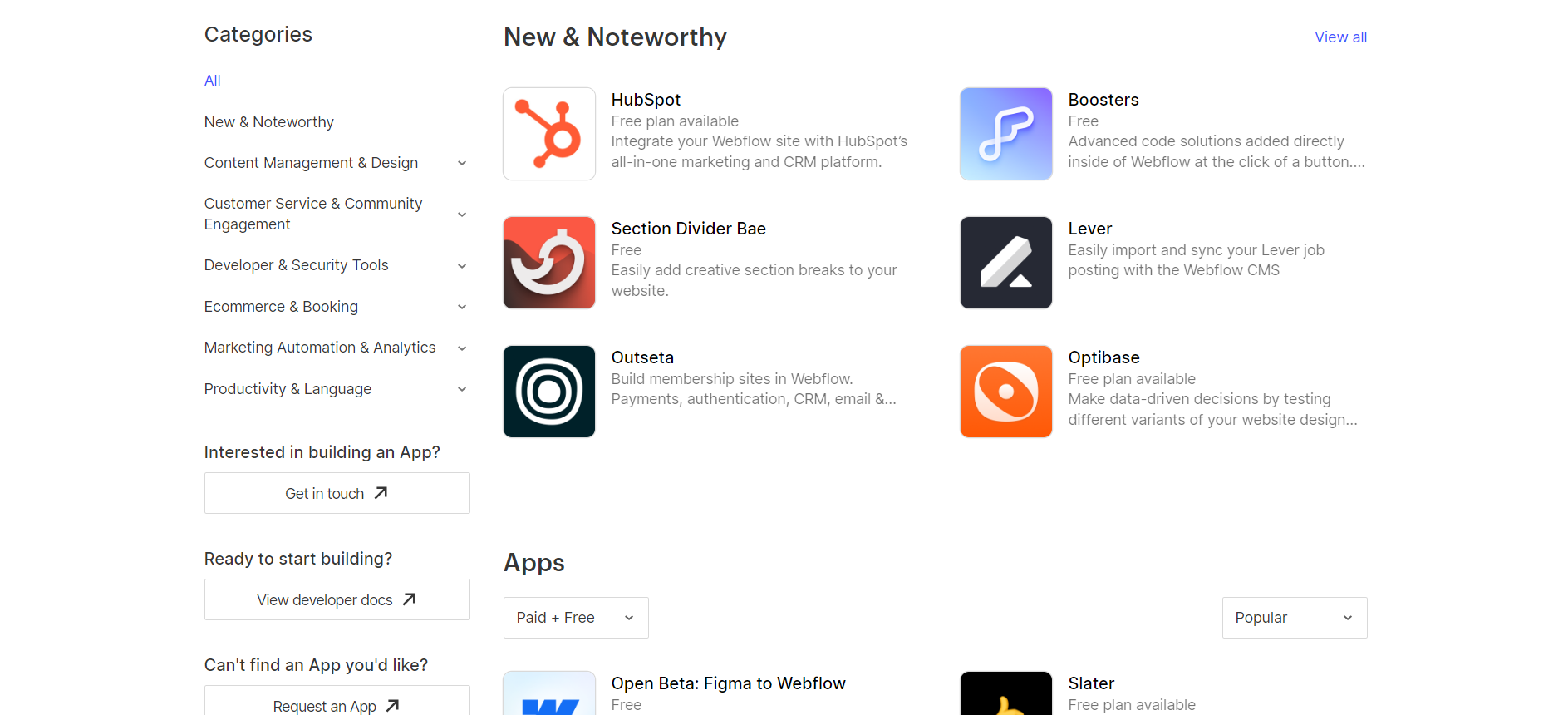
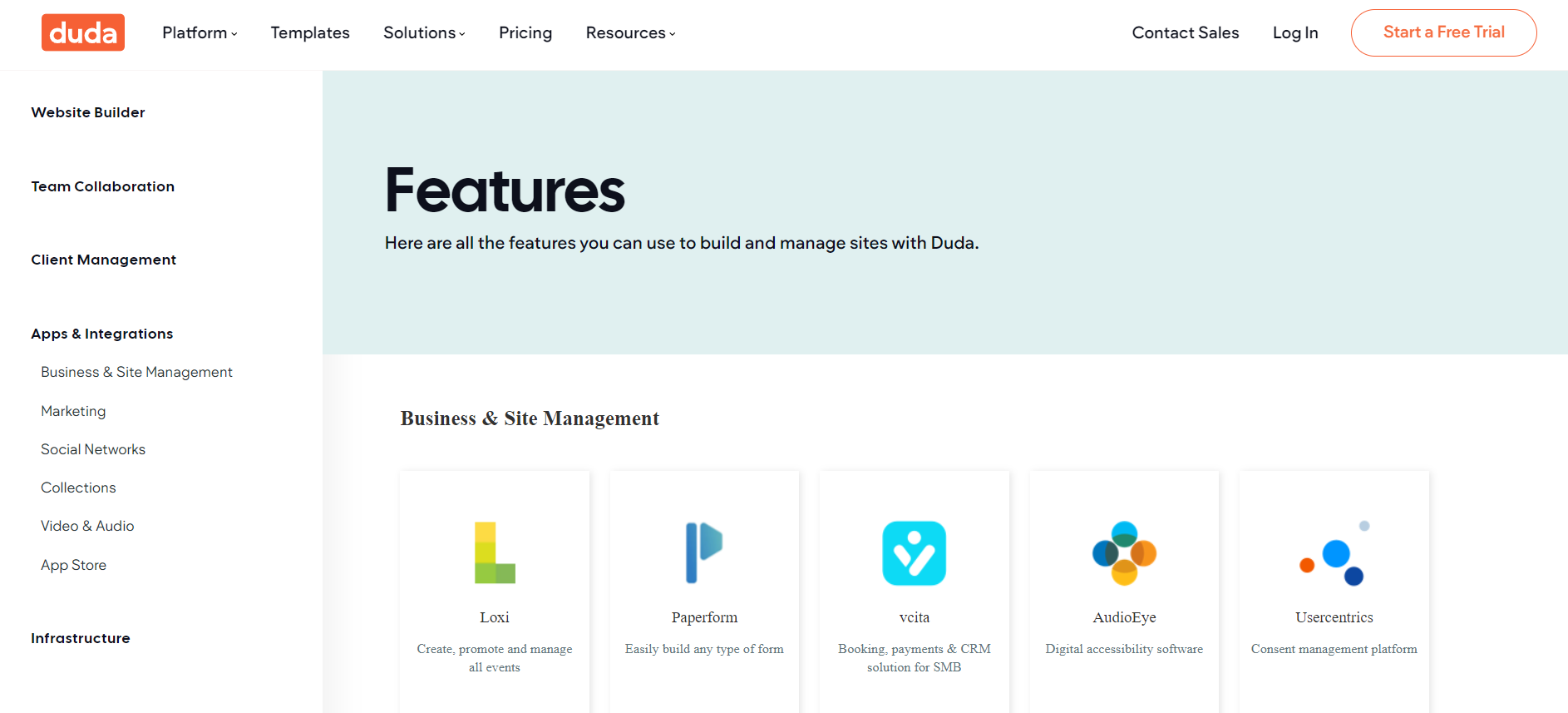
Marketing Features
Marketing featuresAssesses tools and options available for marketing.Score Components:
- SEO tools (40%): Effectiveness of SEO features.
- Marketing automation (30%): Availability and quality of marketing tools.
- Social Media integration (20%): Ease and depth of social media connectivity.
- Email marketing (10%): Quality and usability of email marketing tools.
 7.8
7.8
 7.1
7.1
🏆
Overall Winner: Webflow
. Webflow stands out for its comprehensive marketing tools, especially in SEO, email marketing, and analytics. Duda is strong in social media integration and blogging, ideal for content-driven strategies.

|

|
|
|---|---|---|
|
SEO Tools |
|
|
|
Email Marketing |
|
|
|
Blogging |
|
|
|
Social Media Integration |
Simplifies content sharing and audience engagement on major social platforms |
Yes |
|
Analytics and Reporting |
Integrates with Google Analytics for comprehensive web traffic and behavior analysis |
Supports Google Analytics for comprehensive web traffic and behavior analysis |
|
Ads and Promotions |
Supports ad and promotion management through integration with platforms like Google Optimize |
Personalization tools for promotions, lacking direct marketing automation tools |
Customer Support
Customer supportEvaluates the quality and availability of support options.Score Components:
- Response time (40%): Speed of support responses.
- Support quality (30%): Effectiveness and helpfulness of the support.
- Availability (20%): Range of support channels (phone, chat, email).
- Resource richness (10%): Quality of self-help and educational materials.
 8.3
8.3
 7.5
7.5
🏆 Winner: Webflow
. With a customer support score of 8.3, Webflow takes the lead in this category. Webflow offers 24/7 customer support through various channels including live chat, email, and a community forum. They also provide extensive documentation and video tutorials to help users navigate their platform and troubleshoot common problems.
On the other hand, Duda, with a customer support score of 7.5, offers customer support with expanded hours and availability for different plan tiers. For Team and Agency plans, they provide 24/5 support through email and live chat, Monday through Friday. Spanish Support is available from 9:00 AM to 12:00 PM, and 1:00 PM to 6:00 PM BST (GMT-3). If you require more extensive support availability, Duda suggests upgrading to their Enterprise plan for additional support options.
Security
SecurityLooks at the platforms’ security measures and data protection.Score Components:
- Data protection (40%): Safeguards for user and customer data.
- SSL and encryption (30%): Implementation of secure connections.
- Compliance (20%): Adherence to industry security standards.
- Regular updates (10%): Frequency of security updates and patches.
 7.8
7.8
 8.6
8.6
🏆
Winner: Duda
. Duda’s security measures are more comprehensive, including automatic SSL certificates, a Web Application Firewall (WAF), DDoS protection, regular updates and patches, secure hosting, two-factor authentication (2FA), access controls, backup and recovery options, and monitoring with alerts. Duda also prioritizes data privacy and security, adhering to global standards like GDPR and detailing sharing circumstances in their privacy policy. They emphasize user control, offering options like unsubscribing from emails and managing cookies. Duda has conducted security audits and provides tools to support GDPR compliance, showcasing ongoing commitment to data protection.
Webflow also ensures the privacy and security of user data by implementing robust encryption techniques and strict access controls. They also regularly update their systems and conduct audits to identify and address any potential vulnerabilities, ensuring that user information remains confidential and protected. However, compared to Duda, Webflow’s security measures are not as comprehensive.
AI Capabilities
AI capabilitiesMeasures the effectiveness of AI-driven features and tools.Score Components:
- Automation efficiency (40%): Impact of AI on streamlining processes.
- Personalization (30%): AI-driven customization for users or customers.
- AI-Assisted design (20%): Role of AI in website design and functionality.
- Data analysis (10%): Use of AI in interpreting user data and analytics.
 8.3
8.3
 7.3
7.3

|

|
|
|---|---|---|
|
Personalized Design |
|
AI suggestions for design elements and layouts |
|
SEO Optimization |
|
AI-driven SEO optimization for better search engine visibility |
|
Customer Behavior Analysis |
|
|
|
Sales Predictions |
|
|
|
Inventory Management |
|
|
|
Content Generation |
|
AI assistance in creating and optimizing site content |
🏆 Winner: Duda
. Duda, with a score of 7.3, offers a suite of AI-powered features designed to streamline website building and optimization. These include an AI Content Assistant for efficient content generation, an AI SEO Assistant for automating meta titles and descriptions across site pages, and AI-generated alt text for images to enhance accessibility and SEO.
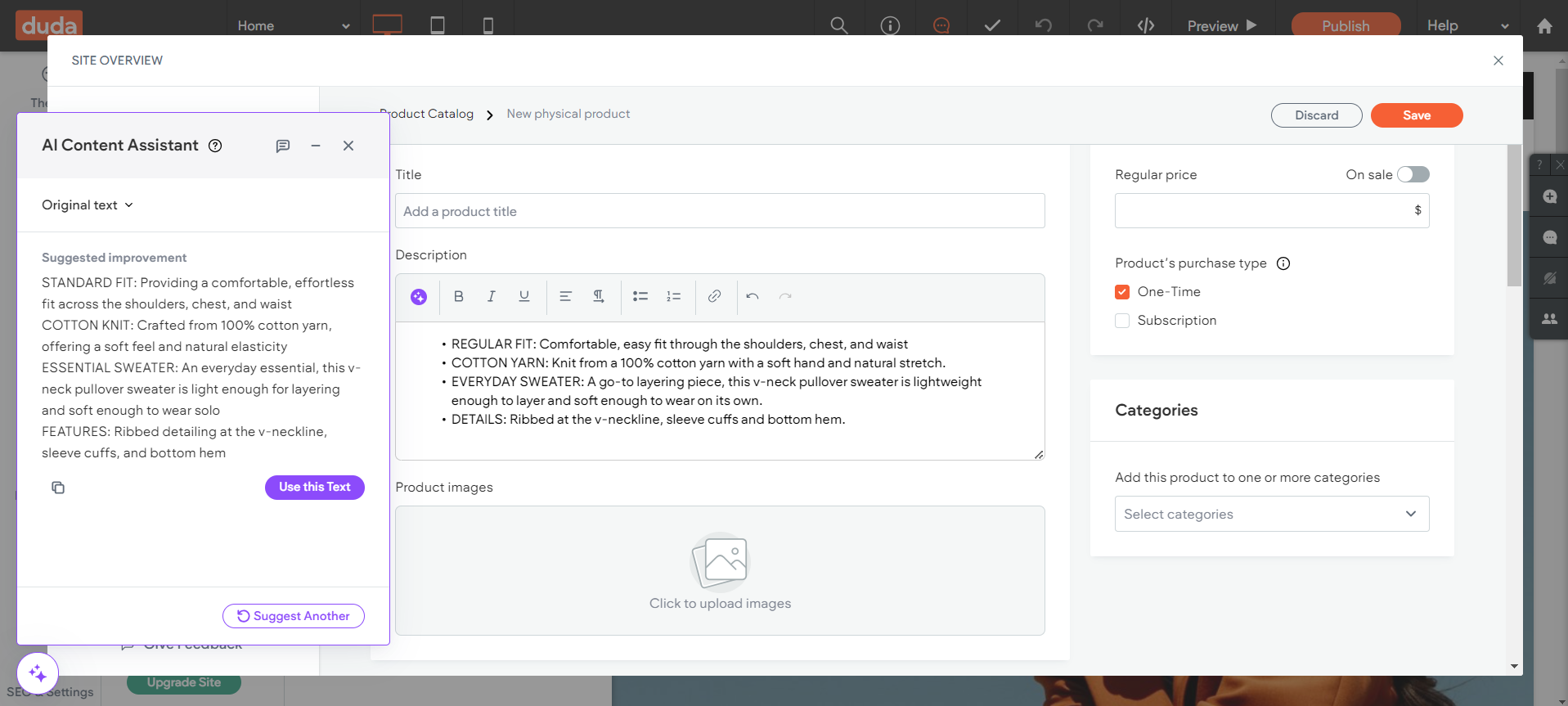
Webflow, with a score of 8.3, does not currently have AI capabilities but has announced plans to introduce them in the future. They’re focusing on leveraging AI to improve the visual development learning journey, create and iterate designs faster with an AI copilot, and offer AI-customized templates for quicker website creation. However, these features are not yet available, and therefore, Webflow does not currently offer AI capabilities.
User Management
User ManagementAssesses the platforms’ capabilities in managing user roles, permissions, and accessibility.Score Components:
- Role Customization (40%): Flexibility in creating and defining user roles and
permissions. - Ease of Management (30%): User interface and tools for managing users.
- Access Control (20%): Effectiveness of access control measures for different user
levels. - Scalability (10%): Ability to manage a growing number of users efficiently.
 8.3
8.3
 8.0
8.0
🏆 Winner: Webflow
. Both Webflow and Duda offer varying levels of user management capabilities, but Webflow edges out with a slightly higher score.
- Webflow’s user management varies by plan, with Core, Growth, and Enterprise plans offering unlimited editors, while others limit content editors to 3 or 10 per site. Access levels include Designer for full access and Editor for content editing. Workspace roles like Admin, Designer, and Editor ensure collaboration and security through features like the Site Activity Log and role-based permissions.
- Duda allows for collaborative website management, with the number of users and permissions varying by subscription plan. Higher-tier plans enable more users to participate, offering roles like Owner/Administrator, Designer, Content Editor, and Developer, each with distinct access levels. Some plans also allow for the creation of custom roles, providing flexibility in team management.
Webflow User Roles and Access Levels:
| Role | Description | Access Highlights |
|---|---|---|
| Workspace Owner | Full control over Workspace settings and member management. | Edit settings, manage billing, access/edit all sites, invite/remove members, manage permissions. |
| Workspace Admin | Similar to the owner with some restrictions. | Edit settings, manage billing, access/edit all sites, invite/remove members (except owner), manage permissions. |
| Workspace Member | Limited control focused on site interaction. | Download invoices, access/edit sites, invite members. |
| Workspace Guest | Temporary collaborators with limited access. | Access/edit sites. |
| Workspace Commenter | Limited to commenting for feedback on sites. | Create/view/resolve comments, preview sites. |
| Site Admin | Full control at the site level. | Manage permissions, delete/transfer sites, billing management, design and publish changes. |
| Can Design | Design capabilities with some restrictions on publishing. | Design in Designer, create/modify classes and components, publish changes with permission. |
| Can Design (Limited) | Restricted design capabilities for Enterprise customers. | Create new classes, modify created classes, limited publishing capabilities. |
| Can Edit | Content editing without full design privileges. | Edit text/links/images, manage assets, publish Collection items and Ecommerce products. |
| Can Comment (Site Level) | Commenting for feedback at the site level. | Create/view/resolve comments, preview sites. |
Additional Features

|

|
|
|---|---|---|
|
SSL Certificate |
|
|
|
Custom Domain |
|
|
|
Free Custom Domain Included |
|
|
|
International Domains |
|
|
|
Mobile Responsive |
|
|
|
Page Speed |
|
|
|
Website Builder Mobile App |
|
|
|
Convert a Website To An App |
|
|
|
Website Analytics |
|
|
|
Multilingual Sites |
|
|
|
Multiple Users |
|
|
User Feedback
Webflow is highly praised for its user-friendly interface, which eliminates the need for coding while offering extensive design flexibility. Users appreciate its scalability, cost-effectiveness, and seamless integration of essential features like forms and CMS. However, some users note a slight learning curve and occasional limitations, particularly in ecommerce functionalities and content management. Overall, Webflow proves to be a powerful tool for building and managing websites, offering robust features for both beginners and experienced developers, albeit with some room for improvement in certain areas like collaborative editing and content management.
Duda, on the other hand, garners positive reviews for its user-friendly interface, extensive customization options, and responsive customer support. Users appreciate its drag-and-drop features, diverse integrations, and ability to cater to both novices and experienced developers. However, some note complexities with certain features like Duda Flex and occasional inconsistencies in design. Despite this, Duda remains a valuable tool for quick and efficient website development and management, offering a balance of ease-of-use and customization.
The making of this blog
We followed a clear, step-by-step process to write and research this article.
FAQ
Which platform is better for professional designers, Webflow or Duda?
Is Duda easier to use than Webflow?
Which platform offers better ecommerce capabilities?
How do Webflow and Duda compare in terms of customer support?
Which platform has better security measures?
Can I manage multiple websites easily on either platform?
Which platform is better for website speed optimization?
Do Webflow and Duda offer AI capabilities?










